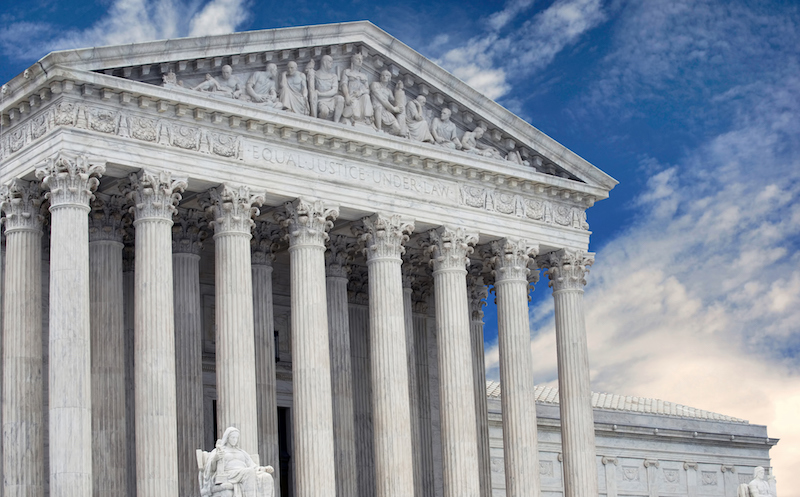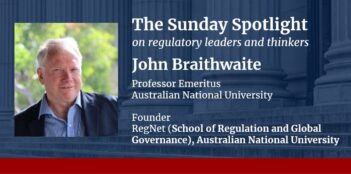
A case challenging sex offender registration could revive the long-slumbering nondelegation doctrine.
Agencies have to interpret statutes to carry out the work of the administrative state. But in the hands of federal prosecutors, does interpretation amount to defining the crime itself?
Herman Gundy believes that is what happened to him. In a case before the U.S. Supreme Court this term, Gundy v. United States, Gundy is challenging his conviction for failing to register as a sex offender under the Sex Offender Notification and Registration Act (SORNA). Failing to register is a federal felony.
Gundy was required to register, even though his sex-offense conviction came a year before SORNA’s passage in 2006. In fact, whether the law itself actually requires Gundy to register is unclear—but a regulation issued by the Attorney General under SORNA required that he register. SORNA gives the Attorney General the authority to “specify the applicability” of the registration requirement to sex offenders who were convicted before SORNA was enacted. Over the years, Attorneys General have issued rules changing how—and to whom—SORNA applies.
Gundy argues that the power of the Attorney General to decide whether the law applies to people like him—who were convicted of a sex offense before SORNA was passed—violates the nondelegation doctrine, a legal principle that provides that Congress cannot delegate its lawmaking powers to other branches of government.
The nondelegation doctrine is rooted in Article I of the U.S. Constitution, which holds that “all legislative powers” are vested in Congress. Yet the Supreme Court has rarely invalidated laws for violating the nondelegation doctrine. Delegations to executive officials like the Attorney General are considered to be constitutional as long as Congress articulates an “intelligible principle” to guide those officials in their decision making.
The Supreme Court has used the nondelegation doctrine to invalidate laws only twice—both times in 1935, when Congress granted sweeping powers to President Franklin D. Roosevelt to regulate the economy during the New Deal. The doctrine has slumbered since then. Former Justice Anthony Kennedy called the doctrine “somewhat moribund” only a few years ago.
But perhaps the doctrine will not remain “moribund” much longer. According to Gundy’s attorneys, SORNA has a giant nondelegation problem: They argue that the law provides the Attorney General “no guidance whatsoever” over how to enforce the law against pre-Act offenders. In fact, they believe SORNA is so discretionary that the Attorney General could choose not to enforce the law against pre-Act offenders at all.
Attorneys General from different administrations have applied SORNA in different ways, each time changing who was required to register. Gundy’s attorneys point out that former Attorney General Alberto Gonzales waited six months after SORNA was passed to issue interim rules. Attorneys General Michael Mukasey and Eric Holder also made changes to SORNA’s applicability to pre-Act offenders, each time changing who was required to register, and for how long.
A wide array of organizations from across the political spectrum filed briefs supporting Gundy’s argument, from the Competitive Enterprise Institute to the American Civil Liberties Union (ACLU). The ACLU argued that the unique “threats to liberty associated with criminal punishment” merit a stronger application of the nondelegation doctrine.
Solicitor General Noel G. Francisco argued in Gundy, however, that giving a federal agency the power to decide to whom a law applies is an unremarkable feature of laws passed by Congress—including criminal statutes. Francisco lists a variety of agencies—including the Securities and Exchange Commission and the Consumer Product Safety Commission—that issue rules that Congress has chosen to make it a crime to violate. In essence, the fundamental choice—whether to punish—was already made by Congress.
At least some of SORNA’s critics believe the prevalence of regulations with criminal sanctions like the ones listed by Francisco is precisely why the nondelegation doctrine should have teeth. The National Association of Criminal Defense Lawyers (NACDL) argues that the court should place meaningful limitations on the power of federal prosecutors as Congress turns more administrative violations into federal crimes. NACDL warns that “the growth of the federal administrative apparatus, and of criminal penalties for regulatory violations, sharpens the need for enforcement of all doctrines relating to the separation of powers.”
Invalidating the delegation of power to the Attorney General has at least one ally on the Supreme Court: Justice Neil Gorsuch. Only a few years ago, when he was still an appellate judge, Gorsuch held that the power of the Attorney General to decide which pre-Act offenders must register under SORNA violated the nondelegation doctrine. “If the separation of powers means anything,” he wrote, “it must mean that the prosecutor isn’t allowed to define the crimes he gets to enforce.”
If the Supreme Court revives the nondelegation doctrine in the Gundy case, it could have an effect far beyond sex offender registration. A decision in Gundy’s favor could usher in a new era of challenges to statutes used to issue rules, such as environmental or consumer protection laws.
Some legal commenters believe the time for a muscular nondelegation doctrine is long overdue. “Due to a combination of increasing societal complexity and congressional cowardice, Congress has punted more and more of its duty to legislate to agencies,” law professors John Yoo, of University of California, Berkeley School of Law, and James C. Phillips of Stanford Law School, wrote in the National Review. “Agencies have been only too happy to assume vast legislative powers, without the accountability of answering to the voters.”
Others worry that the nondelegation doctrine could pose a fundamental threat to the executive branch’s power to regulate. For example, Eric Posner, a professor at the University of Chicago Law School, recently called the doctrine a “discredited” part of a “conservative assault on the administrative state.”
The Supreme Court held oral argument in the Gundy case in October and is expected to rule in the case by next June. By then, the public will know whether the nondelegation doctrine has finally awakened after an eighty-year slumber.



